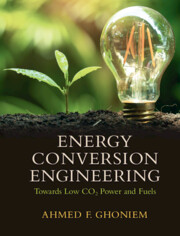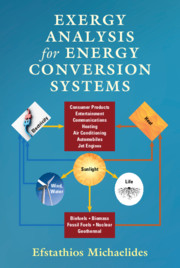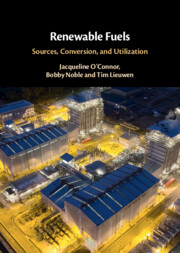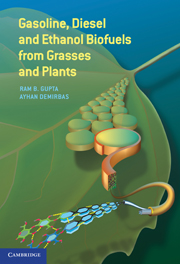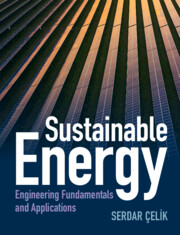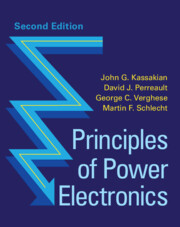Energy Conversion Engineering
Towards Low CO2 Power and Fuels
$105.00 ( ) USD
- Author: Ahmed F. Ghoniem, Massachusetts Institute of Technology
- Date Published: November 2021
- availability: This ISBN is for an eBook version which is distributed on our behalf by a third party.
- format: Adobe eBook Reader
- isbn: 9781108803991
Find out more about Cambridge eBooks
$
105.00 USD
( )
Adobe eBook Reader
Other available formats:
Hardback
Looking for an examination copy?
If you are interested in the title for your course we can consider offering an examination copy. To register your interest please contact [email protected] providing details of the course you are teaching.
-
This unique textbook equips students with the theoretical and practical tools needed to model, design, and build efficient and clean low-carbon energy systems. Students are introduced to thermodynamics principles including chemical and electrochemical thermodynamics, moving onto applications in real-world energy systems, demonstrating the connection between fundamental concepts and theoretical analysis, modelling, application, and design. Topics gradually increase in complexity, nurturing student confidence as they build towards the use of advanced concepts and models for low to zero carbon energy conversion systems. The textbook covers conventional and emerging renewable energy conversion systems, including efficient fuel cells, carbon capture cycles, biomass utilisation, geothermal and solar thermal systems, hydrogen and low-carbon fuels. Featuring numerous worked examples, over 100 multi-component homework problems, and online instructor resources including lecture slides, solutions, and sample term projects, this textbook is the perfect teaching resource for an advanced undergraduate and graduate-level course in energy conversion engineering.
Read more- Interdisciplinary approach offers a broad perspective on energy systems, ensuring students are equipped with the knowledge base required to model and design efficient and clean energy conversion processes
- Covers essential theoretical fundamentals spanning mechanical, chemical, and nuclear engineering, and materials science
- Includes over 350 figures to clearly illustrate concepts and reinforce understanding
Reviews & endorsements
'An outstanding textbook and reference, spanning fundamentals to real-world devices. This book will guide the next generation of engineers who are realizing the low-carbon energy transition.' Timothy Lieuwen, Georgia Institute of Technology
See more reviews'A comprehensive toolkit for understanding, evaluating, and comparing conventional and evolving new energy systems in terms of their engineering performance and environmental impacts and benefits. It is a must-read for students and researchers interested in designing and modeling energy technologies to meet today’s low-carbon-emitting and other sustainability objectives.' Jefferson Tester, Cornell University
'Professor Ghoniem draws from decades of research expertise and teaching experience at MIT in the field of energy conversion. This timely textbook covers both the fundamentals of thermodynamics and real-world applications of cutting-edge clean energy systems to equip the next generation of students to design, analyze, and optimize low-carbon and zero-carbon energy systems for a sustainable future.' Katherine Hornbostel, University of Pittsburgh
'This book provides a holistic view of energy conversion systems by discussing conventional concepts as well as emerging technologies, all of which are connected by fundamental energy conversion principles. I truly believe that readers can envision a bright pathway toward sustainable power generation with low environmental impact.' Jongsup Hong, Yonsei University
'An excellent, up-to-date, and comprehensive textbook and reference in energy conversion. It provides a practical and fresh perspective on the subject, which is nicely complemented with chapters addressing clean energy conversion and strategies to control CO2 emissions. This book is a must-have reference for anyone interested in the subject of energy conversion.' Tarek Echekki, North Carolina State University
'This book is systematically developed, very well organized, and well written. The coverage in all 14 chapters is comprehensive, with example problems and additional problems at the end of each chapter. It is a timely book as we seek innovative solutions for clean energy production at higher efficiency, with due considerations given to environmental pollution, including CO2. I enthusiastically endorse this book.' Ashwani K. Gupta, University of Maryland
Customer reviews
Not yet reviewed
Be the first to review
Review was not posted due to profanity
×Product details
- Date Published: November 2021
- format: Adobe eBook Reader
- isbn: 9781108803991
- availability: This ISBN is for an eBook version which is distributed on our behalf by a third party.
Table of Contents
Preface
1. Low carbon energy: Why?
2. Thermodynamics
3. Chemical thermodynamics
4. Electrochemical thermodynamics
5. Gas turbine cycles
6. Rankine cycles
7. Fuel cells at finite current
8. Combined, oxy-combustion and hybrid cycles
9. Solar thermal, geothermal and integration
10. Gas separation
11. Carbon capture cycles: natural gas
12. Coal power cycles, gasification and synfuels
13. Carbon capture cycles: coal
14. Biomass
Index.
Sorry, this resource is locked
Please register or sign in to request access. If you are having problems accessing these resources please email [email protected]
Register Sign in» Proceed
You are now leaving the Cambridge University Press website. Your eBook purchase and download will be completed by our partner www.ebooks.com. Please see the permission section of the www.ebooks.com catalogue page for details of the print & copy limits on our eBooks.
Continue ×Are you sure you want to delete your account?
This cannot be undone.
Thank you for your feedback which will help us improve our service.
If you requested a response, we will make sure to get back to you shortly.
×
